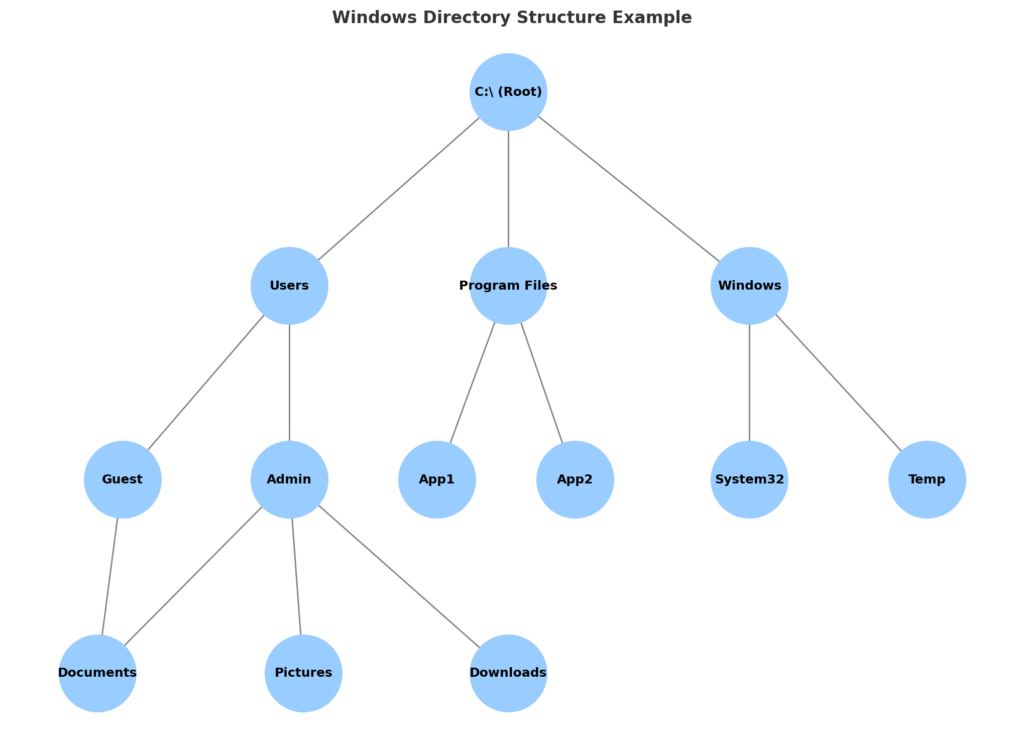1. What is a Directory in Windows?
- In Windows, a directory is a folder that stores files or other folders (sub-directories).
- It helps to organize data systematically.
- Windows supports a tree-like directory structure starting from the root (C:\ drive).
➡️ Example:C:\Users\Admin\Documents\Report.docx
C:\→ Root directoryUsers→ FolderAdmin→ Sub-folderDocuments→ Sub-folderReport.docx→ File
2. Directory Manipulation in Windows
Directory manipulation = creating, opening, renaming, deleting, moving, and viewing directories.
(a) Creating a Directory
- GUI Method:
- Right-click in File Explorer → Select New → Folder → Type name.
- Command Prompt (CMD):
mkdir foldername md foldername
(b) Opening/Changing a Directory
- GUI Method:
- Double-click the folder in File Explorer.
- CMD:
cd foldername cd.. cd\cd foldername→ Go inside foldercd..→ Go back one levelcd\→ Go to root directory
(c) Listing Contents of a Directory
- GUI Method:
- Simply open folder to see files/subfolders.
- CMD:
dir
(d) Renaming a Directory
- GUI Method:
- Right-click folder → Rename → Type new name.
- CMD:
rename oldfolder newfolder ren oldfolder newfolder
(e) Deleting a Directory
- GUI Method:
- Right-click folder → Delete OR Press Delete key.
- CMD:
rmdir foldername rmdir /s foldername (removes folder + contents) del foldername
(f) Moving a Directory
- GUI Method:
- Drag and drop folder to another location OR
- Right-click → Cut → Paste in another drive/folder.
- CMD:
move foldername destinationpath
(g) Copying a Directory
- GUI Method:
- Right-click → Copy → Paste.
- CMD:
xcopy sourcefolder destination /s /e
3. Example Commands (Windows CMD)
Suppose we want to create and manage a folder named BBA_Notes:
C:\> mkdir BBA_Notes (create folder)
C:\> cd BBA_Notes (go inside)
C:\BBA_Notes> dir (list contents)
C:\BBA_Notes> rename BBA_Notes My_Notes (rename)
C:\BBA_Notes> move My_Notes D:\ (move to D: drive)
C:\BBA_Notes> rmdir My_Notes /s (delete folder & contents)
4. Advantages of Directory Manipulation in Windows
✅ Easy navigation with GUI (icons & folders).
✅ Supports both GUI & CMD for power users.
✅ Provides hierarchical structure for organizing data.
✅ Simple copy-paste/drag-drop operations.
✅ Allows permissions and security on folders.
✅ Summary (Exam Note)
- Directory in Windows = Folder that stores files/subfolders.
- Operations: Create (
mkdir), Open (cd), List (dir), Rename (rename), Delete (rmdir), Move (move), Copy (xcopy). - Done via GUI (right-click, drag-drop) or CMD (commands).
- Provides systematic storage, easy retrieval, and security.

Here’s a Windows Directory Structure diagram showing the root (C:\) with its main folders (Users, Program Files, Windows) and subfolders (Documents, Pictures, System32, etc.).
